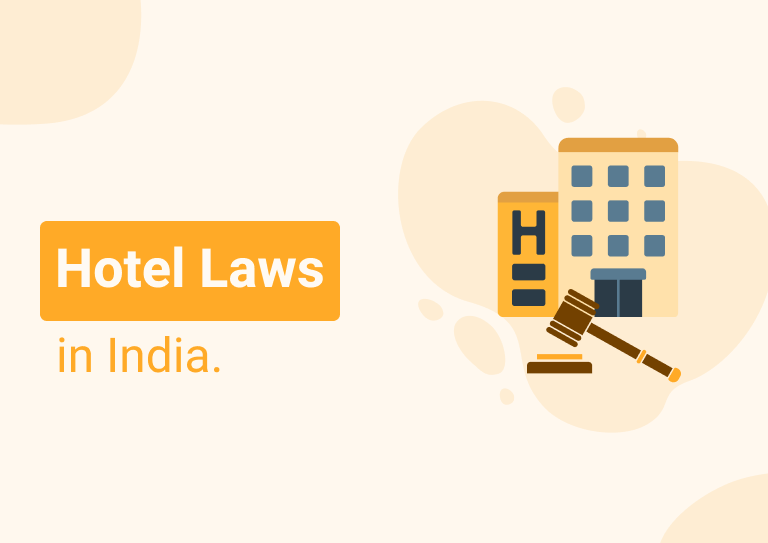India is a diverse country that brings in thousands of visitors from both inside and outside the country. From hill stations to beach resorts, the hospitality industry caters to a wide range of tourists. To run these hotels, hoteliers have to follow certain rules and guidelines. In this guide, we will discuss the important hotel laws in India that every hotelier should know.
What is the need for Hotel Laws in India?
The hospitality industry is a business that is always in demand because tourists will always keep on coming. To make sure everything works well and fair, we need specific laws. These laws help the hospitality industry to run smoothly.

Classification of Hotel Laws in India
The hotel laws in India can be classified into the following categories:
Licensing and Fire Security certificate
This is one of the most important licensing. Without Fire NOC, it is very difficult to get any other permissions. The NOC (No Objection Certificate) has to be obtained from the fire department. After the application is submitted, the inspection will be done by the fire department and the decision on the license will be taken by the senior officials.
Food Safety and Standards
The Food Standards and Safety Authority of India (FSSAI) is the highest authority that is responsible for supervising food safety. As per the law, it is compulsory to take FSSAI basic registration.
Hotels and restaurants that are having annual turnover between ₹12 Lakhs and ₹20 Crore can apply for an FSSAI state license. The following details are required to obtain the FSSAI basic license.
- Identity Proof of the hotel/restaurant owner.
- Address proof of the hotel/restaurant.
- Email ID of the Hotel (Primary mode of contact)
- PAN card of the hotel Owner.
- Utility bills such as water, electricity, or gas bill
- Kitchen layout plan.
- Declaration of Food Safety Management.
- Declaration by CA (Annual Turnover)
- List of food categories being used and served in the hotel.
- Water testing report. This report is provided by the ISI-approved facility that includes the amount of water that has been used in the hotel or restaurant.)
- No Objection Certificate: This certificate is provided by hotel owners, partners, or directors.
- Medical certificates of employees.
Liquor Laws
This license permits hotels to sell, manufacture, or use alcoholic beverages. Each state has different rules for Liquor. So the hotels first need to contact the local authorities.
After that, the hoteliers can contact to state’s excise department to obtain the application form. Necessary documents required for this license:
- Hotel ownership documents
- Building layout of the premise
- Municipal corporation approvals or NOC
- Income tax returns
- Identity proof of the hotel owners.
Employment Laws
These laws are also known as labor laws. The hotel owners must follow various labor laws in India such as the minimum wages act, the Payment of wages act, and employees provident fund. Failing to obtain this licensing, there will be employment issues that hoteliers will face.
These laws regulate various aspects like minimum wages, leave entitlements, employee benefits, and working hours.
Consumer Protection
This law protects the rights and interests of the customers. The hotel owners should provide correct information about their services and prices and must address customers’ grievances carefully.
Customers can make a request to a restaurant or hotel to remove the service charges. If any customer founds that these laws are breaching they can lodge a complaint on the National Consumer Helpline (NCH) if the hotel fails to do so.
If any hotelier disobeys this they will be fined heavy penalties or a civil lawsuit can be charged against them.
Anti-Discrimination Laws
According to this law, it is illegal for any hotel to discriminate against any guest on the basis of race, color, religion, disability, or origin. These actions can be taken in the violations of these laws.
Intellectual Property Rights
This is one of the most important laws as it covers various aspects of the hotel industry such as:
Copyright and Trademarks:
To protect any hotel’s brand identity such as hotel names, hotel logos or any other material can be
The protection of creative works such as written materials (menus and brochures), photographs, artworks, and software used in the hotel industry. Hoteliers need to contact the Intellectual Property Office and follow their guidelines to obtain the license.
Online Presence
As the online presence of hotels is increasing regularly, hotel owners need to take care of their IP concerning domain names, website content, social media account, and marketing material.
Taxation and Financial Hotel Laws in India
Various financial laws and regulations governs the hotel industry are:
- Goods and Services Tax (GST): It involves collecting GST on services and filing regular returns.
- Income Tax Act: This includes annual income tax returns for the hotels.
- Foreign Exchange Management Act (FEMA): This law regulates foreign exchange transactions. Accepting accepting foreign currency for payments or providing foreign exchange services, needs to be done under FEMA guidelines.
Environmental Regulations
To minimize the impact of hotel operations on the environment the hotel needs to practice sustainable practices. Following are the laws that need to take care of:
- Environment (Protection) Act, 1986
- Air (Prevention and Control of Pollution) Act of 1981
- Water (Prevention and Control of Pollution) Act of 1974
- Noise Pollution (Regulation and Control) Rules, Act of 2000
Data Protection Hotel Laws in India
The data protection law for the hotel industry involves the definition of personal data and consent. This law revolves around Personal Data Protection Bill, 2019 (PDP Bill).
Conclusion
Overall, the hotel industry laws are designed to regulate responsible business practices. By following these laws hoteliers can build a strong foundation for sustainable growth.
Get In Touch
I hope you liked my article on Hotel Laws in India.
If you are a hotelier looking for a solution to manage your hotel efficiently, try QloApps- A free Hotel Reservation System.
Also, if you want to share your thoughts or ask any queries, please connect with us on our QloApps forum.

Be the first to comment.